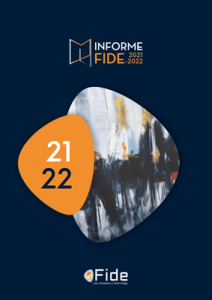
Publications

FOR A NEW LABOR LEGISLATIVE FRAMEWORK.
GROUP CONCLUSIONS FIDE ON A NEW CONSENSUS LEGAL REGULATION OF WORK AND LABOR RELATIONS
Madrid. December 1, 2016
The group of reflection and debate “FIDE” proposes a consensual management of labor relations with the objective of employment, quality work, productivity and competitiveness.
The following are conclusions drawn from the contributions and interventions of all the participants in said group and the experts who have been invited, which although logically do not represent the unanimous opinion of all, notably on the root causes of some of the Current problems and their solutions do reflect the issues on which the debate has focused between specialists in different subjects (jurists, economists, sociologists) and practitioners of various professions (magistrates, university professors, lawyers, human resources directors, managers of Public Administration personnel…).
Have participated in this working group:
- Jordi Agustí Julià, Magistrate of Chamber IV of the Supreme Court;
- Carlos Luis Alfonso Mellado, Professor of Labor Law and Social Security at the University of Valencia - General Studies;
- Ricardo Bodas Martín, President of the Social Chamber of the National Court;
- Martín Borrego Gutiérrez, General Director of the Interconfederal Mediation and Arbitration Service Foundation (SIMA);
- Esteban Ceca Magán, President and Founding Partner of Ceca Magán Abogados SL;
- Juan Chozas Pedrero, Bankia Human Resources Director;
- Jesús Cruz Villalón, Professor of Labor and Social Security Law at the University of Seville, and Director of said Department;
- Carlos de la Torre García, Of Counsel in the Labor Department of Baker & Mckenzie;
- Ignacio García-Perrote Escartín, Partner of the Labor Department of Uría Menéndez, Professor of Labor Law and Social Security at UNED;
- Román Gil Alburquerque, Partner of Sagardoy Abogados;
- Valeriano Gómez Sánchez, Researcher at the Center for Labor Studies of the Ortega Marañón Foundation and economist at A25 Abogados & Economistas;
- Francisco González de Lena Álvarez, Chief of Staff of the President of the Economic and Social Council;
- Fermín Guardiola Madera, Partner at Baker & McKenzie SLP;
- Concha Gutiérrez del Castillo, Inspector of Labor and Social Security;
- Álvaro Hernando de Larramendi, Founding Partner of the Ejaso Law Firm;
- Cristina Jiménez Savurido, Magistrate on leave of absence. President Foundation FIDE;
- Ciríaco Hidalgo, Manager of Government Relations of SEAT;
- Juan Ignacio Lamata Cotanda, Lawyer of El Corte Inglés;
- Luis Fabián Márquez Sánchez, President of the Company Analysts of Industrial Relations SA (Arinsa);
- Pilar Menor Sánchez, Partner in charge of the Labor Law Department of DLA Piper Spain SLU;
- Cristóbal Molina Navarrete, Professor of Labor and Social Security Law, University of Jaén;
- Fernando Moreno Piñero, Lawyer. Director of Arinsa;
- Luis Pérez Capitán, Director of Labor Relations of Iberia;
- Marta Pérez Pertejo, Head of the Corporate Legal Services Labor Area of the State Correos y Telégrafos Society;
- Luz Rodríguez Fernández, Associate Professor of Labor and Social Security Law at the Universidad Castilla La Mancha;
- Fernando Salinas Molina, Magistrate of the Supreme Court;
- María Luisa Segoviano Astaburuaga, Magistrate of Chamber IV of the Supreme Court;
- Antonio Sempere Navarro, Magistrate of Chamber IV, Supreme Court;
- Fernando Valdés Dal Re, Magistrate of the Constitutional Court;
- Agustín Vaquero Gallego, Director of Programs at the Ministry of Employment and Social Security;
- Rosa María Virolés Piñol, Magistrate of the Supreme Court, Chamber IV;
- Rosa Zarza Jimeno, Managing Partner of the Labor Department of Garrigues, Madrid.
All the people who have participated in this working group of Fide, have done so in a personal capacity and not on behalf of the entities, offices, Courts, Universities, companies, or Ministries, where they carry out their professional work, so these conclusions do not reflect and do not include institutional positions but rather particular ones of each one of the group members.




















